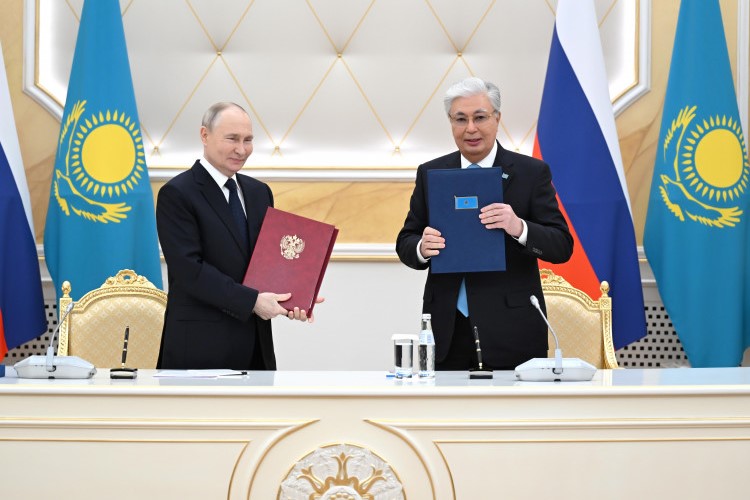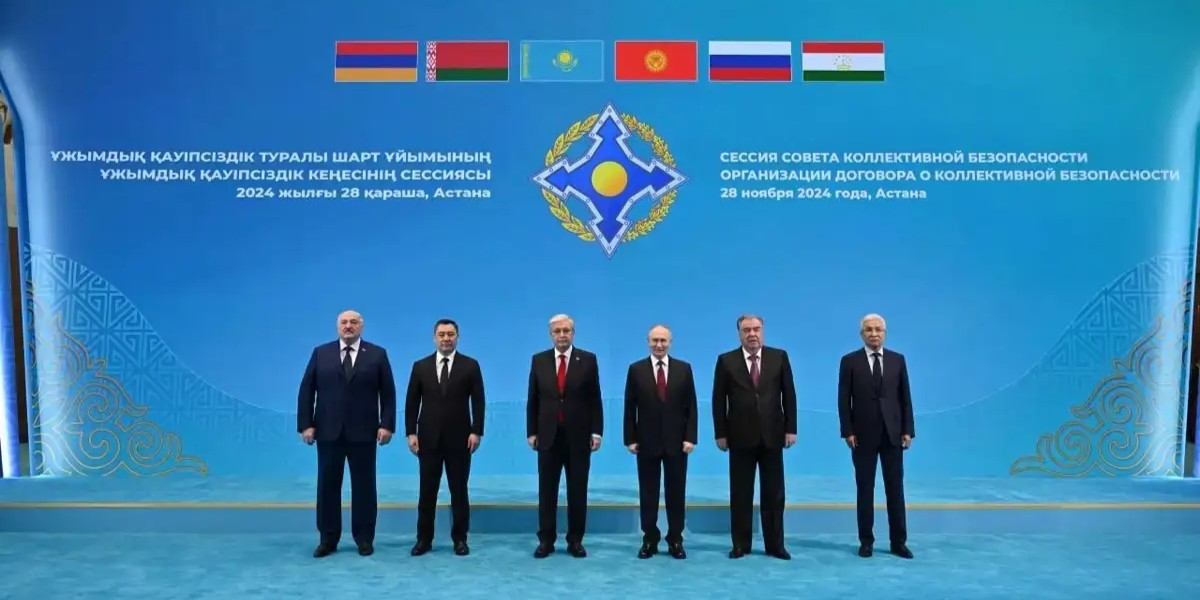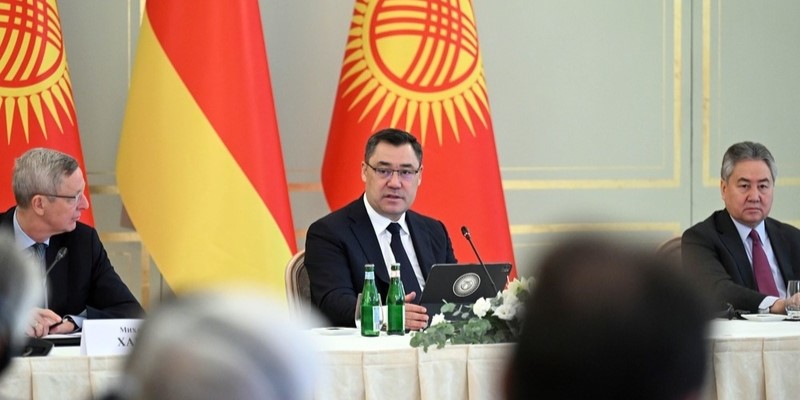Last week, the media reported on Russian President Putin’s visit to Astana to attend the CSTO Collective Security Council summit. They also discussed Kyrgyzstani President Sadyr Japarov’s state visits to Germany and Austria. Outlets in the region also noted several developments in the energy sector, including Kazakhstan’s plans to increase exports through the Turkish port of Ceyhan and its decision to ban gasoline exports outside the EAEU until 2027. Many sources also reported on the depreciation of currencies in the region following the collapse in the value of the ruble. They also explored the various forex interventions by Central Banks in an effort to bolster their currencies.

Kazakhstan and Russia concluded several bilateral agreements during President Putin’s state visit. Source: Astana Times
Diplomatic events
On November 28, Russian President Vladimir Putin arrived in Astana on a state visit to attend the 20th interregional forum between Russia and Kazakhstan and the CSTO Collective Security Council (KazTAG). During his negotiations with President Tokayev, President Putin noted the unusually warm welcome granted to him and stated that Kazakhstan was a firm ally and friend of Russia (Kursiv). President Tokayev said cooperation was expanding in all areas and that the two countries had realized 93 projects and invested $18.3 billion (The Astana Times). He also said he hoped to increase bilateral trade to $30 billion in the near future. During the visit, Kazakhstan and Russia pledged to enhance bilateral cooperation. They signed a joint declaration and 19 other agreements, most notably the program of interregional and cross-border cooperation between the Kazakh and Russian governments for 2024-28 (Kazinform). Regarding cooperation in the energy sector, both sides aim to jointly develop energy production in Kazakhstan by constructing three new thermal power plants (TPP) and integrating their electricity systems (Kazinform). President Tokayev also noted their growing cooperation in the field of renewable energy. Indeed, in recent years, joint projects between the two countries contributed 370 megawatts to Kazakhstan’s grid. President Putin also reiterated that Rosatom was ready to construct a nuclear power plant (NPP) in Kazakhstan (Kursiv). This follows the recent approval of Kazakhstan’s referendum on constructing an NPP. However, President Tokayev has emphasized his preference for an international consortium to fulfill the project. Following several notable trade disputes in recent months over agricultural products, the two leaders stated their readiness to work together on trade liberalization (The Astana Times).
During his state visit, President Putin also attended the CSTO Collective Security Council summit alongside President Lukashenko of Belarus, President Japarov of Kyrgyzstan, President Rahmon of Tajikistan, and President Tokayev of Kazakhstan (Kazinform). Following negotiations, the leaders adopted the Declaration of the Collective Security Council and signed several other agreements, such as the interstate program to strengthen the Tajik-Afghan border (Kazinform). President Tokayev also summarised the results of Kazakhstan’s chairmanship of the CSTO and noted the exercises concerning counterterrorism, drug trafficking, and other transnational crimes (Kazinform). The absence of the Armenian Prime Minister, Nikol Pashinyan, was also noted, as his country moves to leave the organization (Kursiv).

The CSTO Collective Security Council summit was held in Astana last week. Source: Kaz Inform
Kyrgyzstani President Sadyr Japarov visited Austria from November 24-25 (Kabar). He held bilateral talks with President Alexander Van der Bellen and Chancellor Karl Nehammer. Both sides discussed prospects for strengthening cooperation between the two countries. The 9th meeting of the Kyrgyzstani-Austrian Commission on Bilateral Economic Relations occurred. Deputy Minister of Finance Ruslan Tatikov led the Kyrgyzstani delegation and invited Austrian companies to participate in large-scale infrastructure projects in Kyrgyzstan, such as the Kambarata HPP (24.kg). In total, both countries concluded six agreements (AKIpress). Minister of Energy of Kyrgyzstan Taalaibek Ibraev also signed a Memorandum of Cooperation with Andritz Hydro (24.kg). Andritz Hydro is one of the world’s leading companies that supplies equipment and services to HPPs. This comes amid Kyrgyzstan’s attempts to resolve its energy crisis by developing its hydroelectric potential. Last week, the country’s Green Energy Fund announced that in 3-4 years, power shortages may reach 5-6 kWh (AKIpress).
From November 25-27, Kyrgyzstani President Sadyr Japarov also visited Germany (Kabar). During his visit, President Japarov met with German President Frank Walter-Steinmeier and German Chancellor Olaf Scholz. The two countries concluded 17 bilateral agreements, expanding cooperation in several areas, such as infrastructure, energy, and the environment. He also met with German business leaders, including the President of Airbus Europe, Johan Pelissier. He indicated that Kyrgyzstan was ready to purchase two Airbus aircraft to commence flights to European cities.

President Sadyr Japarov met with representatives of German companies on November 27 as part of an official visit to Berlin. Source: AKI Press
Economy and Finance
Amidst Kazakhstan’s ongoing budgetary problems, the lower house of the Kazakhstani parliament, the Mazhilis, approved the country’s 2025-2027 budget along with amendments proposed by the Senate (Interfax). The law sets the overall budget deficit at 2.7% of GDP in 2025, decreasing to 1.9% by 2027. Budget revenues will increase from 15.6 trillion tenge in 2025 to 18.2 trillion tenge in 2027. Expenditures will decrease from 25.8 trillion tenge in 2025 to 24.6 trillion tenge in 2027. These projections are predicated on an average global oil price of $75 per barrel. The Mazhilis also approved the changes to withdrawals from the national fund proposed by the Senate. For 2024, they estimated revenues to be 14.1 trillion tenge, 2 trillion tenge short of what was planned. Meanwhile, they estimated expenditures to be 24 trillion tenge. Thus, the budget deficit rose from 3.5 to 3.6 trillion tenge. As a result, withdrawals from the National Fund have grown from 2 trillion tenge to 3.6 trillion tenge. On the other hand, in Kyrgyzstan, budget revenues increased by 17% so far this year (AKIpress).
In a further hit to the National Fund, Kursiv reported this week that it lost $4 billion in investing in bonds belonging to certain Kazakhstani banks as part of a government support scheme (Kursiv). These bonds had a meager rate of return at 1-3%, well below the rate of inflation. In 2022, the National Funds investment rules were changed so that it could only invest in financial instruments with a 10-12% return. However, it remains unclear under which program the bank acquired the bonds. In 2017, the National Bank allocated $1.7 billion to the banking sector. Kazkommertsbank also received $499 million in 2015, but its new owner, Halyk Bank, later announced it has since repaid these public funds. The World Bank estimates that the Kazakhstani government provided $16.3 billion to the banking sector between 2009 and 2020.
Uzbekistan’s Central Bank announced this week that it expects remittances from migrant workers abroad to increase by 10-15% annually to $20 billion by 2027 (Kun). In the first nine months of 2024, remittances reached $11.3 billion. Overall, the Central Bank expects $4.6 billion in remittances this year, an increase of 25-30%. They attribute this dramatic increase in remittances to a worsening labor shortage and subsequent wage growth in Russia. They also anticipate that the diversification of labor migration away from Russia will also contribute to the growth of remittances. Nevertheless, Russia still accounts for 77% of total transfers.
Kazakhstan’s Central Bank announced that it had decided to raise the base interest rate to 15.25% (The Astana Times). The bank noted increased volatility in the energy and financial markets, rising inflation, and a weakening exchange rate in its decision. The bank also indicated that since November 16, it has performed several foreign exchange interventions to shore up the tenge (Kursiv). In total, the bank sold more than $1 billion from its foreign currency and gold reserves. Since November 27, the tenge lost 3% of its value against the dollar. According to the bank, the depreciation resulted from the decline of the ruble, volatility in global energy markets, and the strengthening of the dollar against other currencies. The National Bank of Kyrgyzstan conducted similar interventions to arrest the decline of the som, selling $92.2 million (AKIpress).
Sanctions
Last week, the U.S. Treasury announced a new package of sanctions against Gazprombank and its Kazakhstani subsidiary (Kursiv). As a result, banks in Kazakhstan, Uzbekistan, Turkey, the UAE, Thailand, India, Vietnam, and Egypt have ceased servicing UnionPay cards issued by Gazprombank. Holders of a Gazprombank card connected to the UnionPay system can no longer withdraw cash from ATMs in these countries. Corporate accounts will also be affected.
Energy
On November 27, during his state visit to Kazakhstan, Russian President Vladimir Putin revealed that Russia plans to increase gas exports to Uzbekistan via Kazakhstan (Kun). Putin emphasized the importance of energy cooperation between the three countries, also noting plans to construct three new TPPs in Kazakhstan. Russia began exporting gas to Uzbekistan through the “Central Asia – Centre” pipeline in October 2023. The three countries have pledged $500 million to modernize Kazakhstan's gas infrastructure to support the increase in exports.
Kyrgyzstan’s Ministry of Energy confirmed that two new floating solar power plants will be built at the Toktogul hydroelectric power plant (HPP) (24.kg). The project will take four years to construct and will produce 612 megawatts upon completion. This week, the Kyrgyzstani cabinet signed off on an investment agreement with several foreign companies, such as Sonnenenergie, AB Progressio GmbH, LTI ReEnergy CleanTech Project Development UG, and two Kyrgyz companies, SES Toktogul OJSC and SES Toktogul KG. These investments come as Kyrgyzstan confronts a state of emergency in its energy sector and attempts to expand renewable energy production.
Last week, Kazakhstan’s Energy Minister Almasadam Satkaliyev announced plans to significantly increase oil exports through Türkiye’s Ceyhan port, reducing its dependency on pipelines through Russia (Daryo). Currently, Kazakhstan transports 80% of its oil exports through Russian pipelines. They aim to grow their exports through the Baku-Tbilisi-Ceyhan pipeline from 1.5 million tons to 20 million tons annually. In 2024, Kazakhstan aims to export 68.8 million tons of oil through several channels. They will transport 55.4 million tons through the Caspian Pipeline Consortium to Novorossiysk, 8.6 million tons through the Atyrau-Samara pipeline, 3.6 million tons via the Caspian Sea, and 1.1 million tons to China. This comes amid Kazakhstan’s efforts to decrease its reliance on Russia and increase oil production.
Kazakhstan conducted an online auction for six oil and gas fields, with Chinese companies claiming the lion’s share (Kursiv). For instance, Pro Explore Mining Co. Ltd won the rights to explore the Kigash oil field. Sozak Oil and Gas, a consortium established by several Chinese companies, acquired the rights to Bestakyr field. Astana Guangming Mining Co. Ltd will explore the development of the Aznagul field. Zhonghengyongsheng Energy Co. Ltd will explore the Kulsary field in the Atyrau region, and RV-Oil & Gas will explore the Chingiz-Telsu oil field. In recent years, Kazakhstan has sought to expand oil production. The country aims to produce 100 million tons by the end of 2026 (Daryo).
From the beginning of 2025 until 2027, Kazakhstan will ban gasoline and diesel exports outside of the Eurasian Economic Union (EAEU) (Reuters). According to the country’s Energy Ministry, Kazakhstan has experienced an unusually sharp increase in domestic fuel consumption (KazTAG). This ban will help reduce the deficit of petroleum products and fill unused capacity at the country’s refineries. It will also help prevent the re-export of Russian petroleum products outside of the EAEU. Finally, the ban will also pave the way for liberalizing fuel prices in Kazakhstan and creating a common EAEU energy market, which has been pushed from 2025 until 2027.
Environment
Last week, the 2024 United Nations Special Programme for the Economies of Central Asia (SPECA) Economic Forum and Governing Council met in Dushanbe, Tajikistan (Asia Plus). The participants included high-level delegations from Azerbaijan, Kazakhstan, Kyrgyzstan, Tajikistan, Turkmenistan and Uzbekistan. They discussed enhancing collaboration across several critical sectors, including digitalization, the green transition, water cooperation, and trade facilitation. They also concluded several new initiatives, such as the SPECA Climate and Innovation Dialogue, SPECA Forum of Climate Smart Cities, and SPECA Concept of Development until 2030. All sides discussed operationalizing the SPECA Multi-Partner Trust Fund, which funds regional green projects. The participants also adopted the Dushanbe Declaration, highlighting the importance of cooperation in trade facilitation, green energy development, and attracting green investments.

